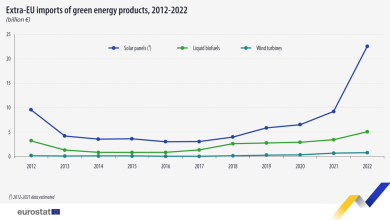Brexit: An expensive divorce
Days before the European Council on October 19-20, the EU chief negotiator Michel Barnier was saying that the Brexit negotiations reached ‘deadlock’ over Britain’s financial settlement and recommended that the next phase of talks are delayed until at least December. Also before the Council, European Parliament President Antonio Tajani said in an interview that Theresa May’s offer to pay a EUR 20 billion divorce bill for leaving the EU is ‘peanuts’. “We need our money back as Mrs. Thatcher said 30 years ago,” Tajani stressed.
The EU summit in Brussels hasn’t solved many of the problems and the warm speeches and messages from the European leaders may not be of much help for British PM Theresa May. She made a concession by saying that the amount of EUR 20 billion she had mentioned in the Florence speech “was not the final word” and that “Britain will honour its commitments”, in hope of receiving some signs that the EU leaders expect to get a deal in the coming period.
German Chancellor Angela Merkel said the talks are moving forward step by step and that “the ball is not only in Britain’s court, it’s in our court. We haven’t put in clear terms how we’re going to respond to what Great Britain expects of us.” Other leaders have had soft approaches as well, but nothing much has changed, as the deadlock is connected to the ‘bill’ Brussels is demanding and which is about EUR 60 billion. As British PM May left the EU summit on October 20, it took about two minutes for the European leaders to approve a statement saying that Britain has failed to make ‘sufficient progress’ on offers to settle three key issues on a withdrawal treaty – i.e. the rights for EU citizens in Britain, the new Irish border and the ‘Brexit bill’, nevertheless they hope reaching a deal at the next summit in December.
However, it’s not quite clear what London’s stance is, as there are different opinions within the cabinet, not to mention the entire political arena. Just before the summit in Brussels, senior members of Theresa May’s Cabinet revealed an open split within the cabinet over whether Britain could walk away from Brexit negotiations without a deal. Brexit secretary David Davis told MPs that it was ‘sensible’ to prepare for the possibility that there is no deal at the end of Brexit negotiations, while the International Trade Secretary Liam Fox told the BBC that no-deal would ‘not be the Armageddon that some people project.’ However, the Home Secretary Amber Rudd said that the prospect of leaving the EU without any kind of deal would be ‘unthinkable.’ Brexit Secretary David Davis is said to present different options to Cabinet shortly, including a no-deal outcome. But Government sources denied a report that he would give an ‘upbeat’ assessment of a no-deal Brexit. In turn, former Conservative leader Iain Duncan Smith said “all talk about ‘sufficient progress’ in talks is of course a crude smokescreen to disguise a naked attempt to force the UK into a divorce bill – as much as GBP 90 billion – with nothing in return. That is why the talks have stalled.”
Facing opposition from her own Conservative Party right-wingers in terms of the ‘bill’ to be paid to the EU and tough debates from the opposition, PM Theresa May will have to cope with at least similar challenges from the economic environment and the pressure is mounting from the giant financial sector. A failure in this regard and then the ‘bill’ to be paid may lose importance by comparison to the losses in the City. The companies in the City have already started to shake the waters, saying they have no choice but to dust down plans to relocate abroad if the Brexit negotiations deadlock drifts on past Christmas. All firms have contingency plans to move jobs out of London if Brexit would stop them from serving clients in Europe. Goldman Sachs’ boss has begun saying how much he was enjoying Frankfurt – fuelling doubt over the banking giant’s commitment to London after Brexit. Drawing the line, the giants in the financial area have told the Government that a positive sign at the next EU summit in December would give them the confidence to stay. Otherwise…
Economy is growing at a small pace, as preliminary data is likely to show GDP grew by 0.3% in Q3, the same as in the previous three months. But the inflation rate has reached in September the highest level in five years, i.e. 3% according to the Office for National Statistics. In order to offset this development, the Bank of England could raise the interest rates on November 2 from 0.25% to 0.5%, the first increase in more than a decade. Meanwhile, the cost of living is going up, statistics also reveal. According to analysts, the sharp fall in the value of the GBP following the UK’s vote to leave the EU last year has raised the cost of imports and pushed up the rate of inflation.
BRITISH OIL AND GAS MAY FACE 100% RAISE IN COSTS
UK’s oil and gas industry is not out of risk if no agreement is reached in terms of Brexit. A recent survey conducted by an industry group says the oil industry could witness doubling the trade costs. The warning came as the oil and gas companies in the region boost the investments in the UK’s continental shelf due to government incentives. The survey also reads that the investment appetite currently high in the UK’s part of the North Sea would slow down as labour costs and equipment costs surge – a result of UK’s reverting to the WTO rules if a trade agreement with the EU is not reached. Let’s recall that about 5% of the employees in the oil and gas industry are EU citizens, non-British, according to a report by Oil & Gas U.K, of which 70% are skilled and half of them have managerial roles.
A recent Wood Mackenzie report reads that the British part of the North Sea has become the second most attractive area for deals after the U.S. shale. As some companies sell their blocks, French Total has expanded in the area, whereas operation costs per unit in the North Sea are falling – BP has cut its production costs from USD 30 a barrel to about USD 15, envisages USD 12 by 2020. Shell and other producers have managed to cut costs by as much as 60%.
On the other hand, new deposits are being discovered. Recently, Statoil and partners have made an oil discovery in the Verbier side-track well in the outer Moray Firth on the U.K. Continental Shelf, proving a minimum of 25 million recoverable barrels of oil in the immediate vicinity of the wellbore. The preliminary results suggest the discovery could range anywhere between 25 and 130 million barrels of oil.
But, due to the possible failing to reach a deal on Brexit with the EU, costs could double and hit hard the oil and gas industry. The Oil & Gas U.K. study on the effects of a possible unfavourable Brexit scenario reads that the costs of trade could increase from USD 791 million currently to USD 1.45 billion. This is the worst case, the study reads, nevertheless it draws attention that the North Sea is one of the areas with highest costs worldwide and the companies could deal with huge costs for decommissioning and field depletion.
OECD COMES WITH A SOLUTION
The Organisation for Economic Co-operation and Development (OECD) has come with a solution. Anticipating only 1% GDP growth next year due to the Brexit uncertainties with reluctance on the financial markets and falling exchange rate, OECD believes a second referendum would have a significant positive impact on the U.K. economy.
And yet, such a turn is unlikely due to the British political situation and to the variety of opinions taken by the main players regarding Brexit. Without a united vision, such debatable decisions are most improbable.
Before drawing the line, we should look at the tangible result of Brexit, the first one. For the first time in seven years, the number of divorces has grown in the U.K. last year, up to 107,000 marriages were terminated (by 6% more than in 2015) and specialists say they are partly the result of family disputes about the Brexit. The spouses could not agree on a sole position – for or against leaving the EU. Most probably, a second referendum would not help the divorced people anymore.







